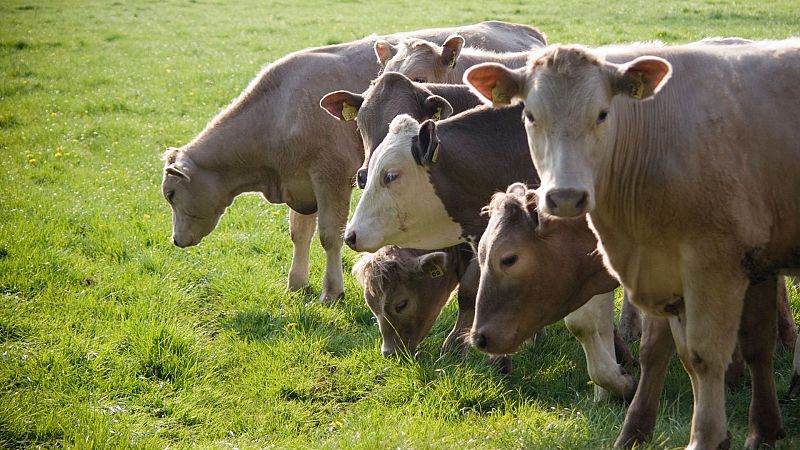
The European Union and the UK announced an agreement on Monday to strengthen cooperation, the first such deal reached since the UK left the bloc in 2020.
As well as outlining new arrangements linked to travel, defence and fishing, the “reset” focuses on farming, an industry heavily impacted by Brexit.
Under the terms of the new deal, British animal and plant products are expected to face fewer checks when exported to the EU. For example, the UK could once again be allowed to export raw sausages and burgers to the EU for the first time since Brexit — thanks to the proposed SPS (sanitary and phytosanitary) agreement. However, the implementation details are still pending.
In order to remove trade barriers, the UK must align its agri-food standards with EU rules, overseen by the European Court of Justice. Standards are already similar, although the British government said there would still be a “short list of limited exceptions to dynamic alignment”.
In an analysis published earlier this year, the OBR estimated that the UK’s exports and imports would be around 15% lower in the long run as a result of Brexit.
In terms of food products, exports to the EU fell by around 34% between 2019 and 2024, according to the UK’s Food & Drink Federation.
Testing the temperature for future alignment
“British exporters have been seriously hit by the bureaucracy they face trying to get food and plants and animals across the frontier into the EU,” Charles Grant, director of the Centre for European Reform, told Euronews.
“So I think the deal on plant animal health is actually quite important. Not macroeconomically significant, but important for one sector of the British economy.”
An SPS agreement between the EU and the UK could raise UK agri-food exports to the bloc by 22.5% and imports from the EU by 5.6%, according to a paper published by Aston University last year.
That would raise total UK trade in goods and services by 0.3%, researchers from the CER added, which would only provide a very small lift to GDP.
“An SPS deal is also important in another way,” said Grant. “The British will have to agree to follow EU rules as they change on SPS. If you do it in that instance, you could do it in other areas too, like energy, for example, or chemicals or pharmaceuticals.”
Concerning goods coming from the EU to the UK, exporters don’t yet face full checks, although Monday’s agreement is set to ease future restrictions.
Trading barriers not entirely eliminated
Monday’s announcement doesn’t mean the UK is back in the customs union, where no duties are charged when goods are transported from one EU country to another.
“You're not completely out of the woods as you would be if we rejoined the single market and the customs union, but that's something the government said the UK wouldn't do,” Jill Rutter, senior research fellow at UK in a Changing Europe and KCL, told Euronews.
“You'll still have to have people to do your customs for you and you'll need VAT representatives in EU countries and things like that.”
While Rutter said the deal could particularly help SMEs with cumbersome bureaucracy, she added that businesses will be waiting for more details.
“The document calls it a renewed agenda. But it is rather a massive agenda for a welter of future negotiations, because not very much has actually been really agreed… we’ll have to see how those discussions go.”
President of the UK’s National Farmers Union, Tom Bradshaw, echoed those reservations in the group’s press statement.
“The government’s ambition to make it easier for the sector to trade with our largest overseas partner is welcome. Of course, as always in trade agreements, the detail is king and we will be scrutinising the specifics of this deal as they become available in the coming weeks, and as talks continue between the UK Government and the EU.”
Wider reasons for a rapprochement
In the face of Russian aggression and a more unreliable US administration, closer EU-UK ties feed into a wider geopolitical strategy, Guntram Wolff, senior fellow at Bruegel, told Euronews.
“The economic significance of fisheries and other economic cooperation is relatively minor. …A more important economic question at this point is how deeply the defence industrial base will be integrated across the Channel.”
On Monday, the two sides signed a defence and security partnership, meaning they will coordinate on sanctions and some security policies. It could also allow the UK to access a €150bn fund of loans for defence projects, backed by the EU budget. However, whether the UK can fully access this will depend on the terms of the partnership, which remain under negotiation.
“The direct economic impacts of today's agreements will be modest, but positive,” said Jonathan Portes, professor of economics and public policy at KCL.
“While food, fishing and youth mobility have dominated the headlines, closer cooperation on energy and defence procurement are much more important and will benefit both sides — although there's lots of detail to be worked out.”







